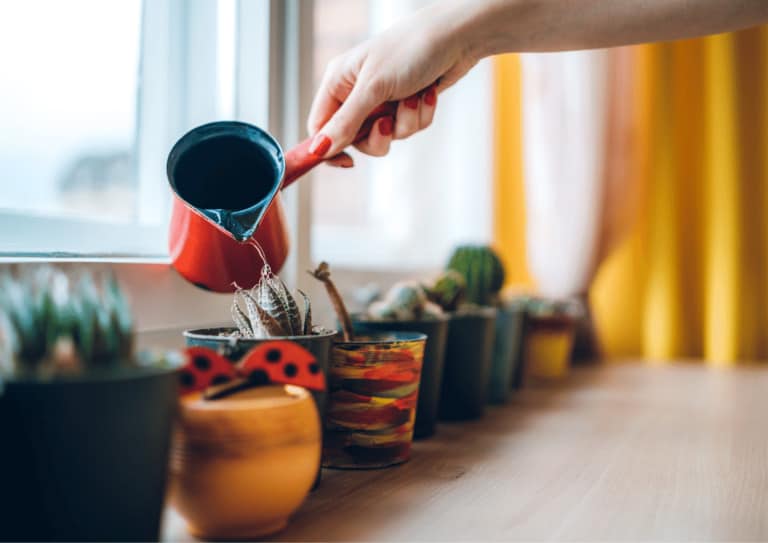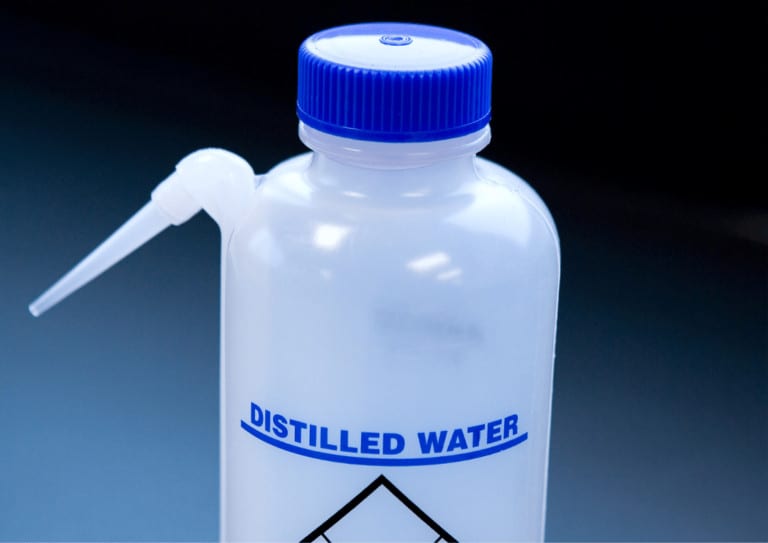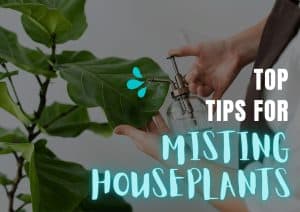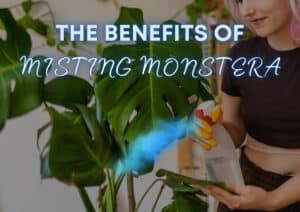Distilled Water For Houseplants: The Good, The Bad, And The Ugly
- Lakeisha Ethans
- June 7, 2022
If you buy something using the retail links in our articles, sometimes we earn a small affiliate commission. This does not impact the products we recommend.
Plants can be very sensitive and delicate, especially when you’re trying to not just grow them, but grow them to their fullest potential. Even the smallest change in their care can dramatically improve or reduce their chances of full health. The kind of water you use is one of these seemingly small factors that can make a huge difference.
It’s well-known in the world of plant care that using straight tap water is often not ideal when it comes to watering plants. This is because tap water contains all sorts of harmful chemicals that can impede a plant’s growth or even kill a more sensitive plant. That’s why many plant-owners opt to use other types of water that remove some of these chemicals. One of these types is distilled water, but is that safe for plants?
Distilled water can safely be used for plants and is much better than tap water when it comes to plant care. The process of distillation removes many of the harmful chemicals that make tap water dangerous for some flora. With that being said, it is not the best type of water for plants and has its share of upsides and downsides.
Distillation is a process by which water is emptied of its impurities through evaporation via boiling. The evaporated steam is then collected as it condensates and turns back into water, and the collected condensation droplets are what we know as distilled water. This results in water at a pH level of 7 which is close to “pure”.
In this article, we aim to explain what happens when distilled water is used for plants and what other water options can be used for your plants. We cover the following topics:
- What are the upsides of using distilled water for plants?
- What are the downsides of using distilled water for plants?
- What are the best kinds of water to use for plants?

What are the upsides of using distilled water for plants?
Most water comes with its fair share of impurities. Some of these impurities are minerals that are beneficial to plants, but others are harmful chemicals, such as chlorine, fluoride, and heavy metals, that can harm plant growth. These chemicals and minerals build up over time, causing even more problems and clogging the soil.
Distillation has been found to remove a vast majority of these impurities – that’s why it’s safe for humans to drink! This is the main reason that people opt to use distilled water for their plants – it’s a soft form of water that won’t harm flora. Common water softeners are also harmful to plants, so using softened tap water is not a good option.
Some extra sensitive plants will not be able to survive at all with tap water and need distilled water or similarly purified, “dead” water to grow.
Hydroponic gardens also benefit tremendously from distilled water, as it allows gardeners to choose exactly how much of any given mineral is used in their garden. Many hydroponic gardeners find it better to purchase mineral supplements than to rely on the uneven and unpredictable mineral levels of non-purified water.

What are the downsides of using distilled water for plants?
Distilled water has almost all of its chemicals and impurities removed, and that sounds like a good thing on the surface. However, this also means that minerals aren’t present in the water, so plants are unable to benefit from them. This can cause nutrient deficiencies, especially in calcium and magnesium, which are crucial for plants.
This means that plants watered with distilled water will need nutrient-rich fertilizers and supplements that make up for the lack of mineral content it holds. Cal-mag supplements are quite common for this purpose.
It’s also worth noting that distilled water has a pH of 7, which is not normally found in the environment. This pH level can drop to 5 or 6 over time, so you must keep checking on the pH levels of your watering sources to ensure that they’re optimal for your plants – especially if you’re a hydroponic gardener!
What are the best kinds of water to use for plants?
Distilled water has its fair share of pros and cons, and that means that while it’s one of the best water options for plants, it’s also not the top of the list. Here are the other types of water you might use, arranged in order from best to worst.
1. Rainwater or melted snow
Rainwater is the very best kind of water, packed with minerals and easily, naturally available. In colder climates where rain is scarce, melted snow works similarly, containing the same minerals in abundance, just in a frozen form. Since they’re not processed, they’re free from the toxic chemicals you’d worry about from tap water.
2. Spring water
Water taken from a spring is a natural resource, meaning it lacks dangerous chemicals but is rife with great, nutritious minerals. The primary difficulty here is in finding a purely natural spring to take water from, but if that’s an accessible option to you, it’s a close second-best to rainwater!
3. Fish tank water
If you have an aquarium with fish in it, the water from that aquarium can be extremely beneficial to your plants. Why? Well, water in a fish tank starts out as plain tap water, but the water filters and conditioners used in aquariums help to filter out the worst of the toxic chemicals you don’t want. Better yet, the small amount of animal waste present in fish tank water from your fish acts as a mild fertilizer. It’s a common misconception that this may cause your plant to smell bad; there will be no change in your plant’s scent.
4. Reverse osmosis water and purified water
Reverse osmosis or R/O water involves the removal of all impurities from water. IT gets rid of all the toxic stuff you don’t want in your plants, but it also removes positive minerals that can nourish them. Fertilizer is usually necessary if you choose to use R/O water, to make up for the mineral loss. Meanwhile, purified water is essentially distilled water that has undergone an extra step to fully remove everything from the water, making it have the same composition as R/O water. As such, purified water is equally beneficial.
5. Distilled water
Here’s where distilled water falls on the list. It’s not that much worse than reverse osmosis water and most people find the differences in quality between the two for plants to be negligible. Both processes remove helpful minerals, which is good when you’re planting with fertilizer but bad if you’re going for rich, healthy water. However, distilled water falls short of R/O water on this list because distillation doesn’t successfully remove all contaminants in water and may still contain some toxic runoff, especially if you don’t distill water yourself. Homemade distilled water is closer to R/O water in benefit for plants.
6. Tap water
It’s okay to use tap water for some plants, but more sensitive flora will likely face damage from the chemicals inside this type of water. Tap water’s mineral content is only good because it has a high content of all other “impurities”, such as chloramine and chlorine. Some people falsely believe that leaving tap water to sit overnight will purify it, but this is not true and can actually increase chemical concentration as water evaporates.
7. Softened water
Hardened water is often softened with softener by those who prefer soft water. This type of water should never be given to plants, as the softener chemical can harm them and prevent healthy growth.
8. Salt water or sugar water
You should never, ever give these types of water, or any water with similar additives, to your plants. The additives will crust over the top of the soil, attract pests and bugs, serve as grounds for mold growth, and overall be terrible for your plant! Plain water is always the better option.
Take home message
Distilled water can be used for plants, and is a better option than tap water because it is free from most harmful or toxic chemicals that are present in normal water. However, it also lacks essential minerals that your plants could need, and its pH level has to be cautiously maintained. The use of pH checkers, fertilizers, and supplements is common among plant-owners who use distilled water.
With that being said, distilled water is not the best kind of water for plants. Rainwater, melted snow, genuine natural spring water, fish tank water, and reverse osmosis or purified water are all better options. Still, distilled water is perfectly fine to use, as long as you make up for its downsides well!

Lakeisha Ethans
Houseplant Writer
Mother to two humans and hundreds of plant babies. Lakeisha uses her 15 years of experience as a content writer to specialise in simplifying what you need to know to grow and care for all indoor plants.
Similar Posts
Top Tips For Misting Your Indoor Plants
We'll cover the bases involved with misting your houseplants including how often you should ideally plan to mist your foliage.
The Benefits Of Misting Your Monstera Plant: Proper Techniques Explained
Discover the benefits of misting your Monstera including how it improves plant health, prevent pests, and creates a better overall growing environment.



